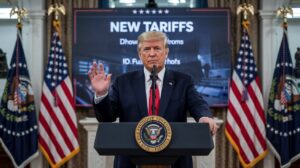FDA’s Top Vaccine Official Resigns Amid Controversy Over Misinformation
In a major shake-up within the U.S. public health sector, Dr. Peter Marks, the FDA’s top vaccine official, has resigned amid growing controversy over misinformation and transparency issues. Dr. Marks, who has played a crucial role in vaccine regulation and the COVID-19 response, announced his resignation effective April 5, raising concerns among health experts about the future of vaccine oversight in the country.
Why Did Dr. Peter Marks Resign?
Understanding the reason behind Dr. Marks’ resignation is crucial for those following U.S. vaccine policies. His departure follows increasing tension between the FDA and Health and Human Services (HHS) over the handling of vaccine regulations. Reports indicate that he faced internal pressure and conflicts with HHS Secretary Robert F. Kennedy Jr., who has been vocal about restructuring federal health agencies and questioning vaccine safety. His resignation comes at a time when misinformation about vaccines continues to spread, influencing public perception and government decisions.
| Factor | Explanation |
|---|---|
| Misinformation Issues | The rise of vaccine misinformation has created tension within regulatory bodies. |
| Political Pressure | Conflicts with HHS Secretary Robert F. Kennedy Jr. on vaccine policies. |
| Transparency Concerns | Dr. Marks advocated for clear communication, which clashed with political interests. |
The Impact on Vaccine Policy and Public Health
Dr. Marks was instrumental in the FDA’s vaccine approval process, ensuring that COVID-19 and other vaccines met rigorous safety and efficacy standards. His exit leaves a leadership gap in the FDA’s vaccine regulation at a time when new vaccines for emerging diseases and variants are in development.
Key Concerns for Public Health:
- Trust in FDA Regulations: The resignation raises doubts about the FDA’s ability to operate independently without political influence.
- Slow Vaccine Approvals: With a leadership gap, regulatory processes might take longer, delaying new vaccines.
- Vaccine Hesitancy: As misinformation spreads, public confidence in vaccines may decline further.
| Area Affected | Potential Consequence |
| Vaccine Development | Slower approvals and increased scrutiny. |
| Public Trust | Potential decline in confidence in vaccine safety. |
| Global Health | U.S. influence on worldwide vaccine policy may weaken. |
What’s Next for the FDA?
With Dr. Marks stepping down, the FDA now faces the challenge of finding a suitable replacement. However, experts argue that his leadership and experience will be difficult to match. His departure adds to a growing list of senior officials leaving key regulatory positions, raising concerns about continuity in U.S. public health strategies.
Possible Outcomes:
- Appointment of a New Leader: The Biden administration will have to act quickly to fill this role.
- Stronger Oversight Measures: Public health experts may push for better transparency and stricter regulations.
- Continued Political Influence: Ongoing debates may continue to shape vaccine policy.
Possible Outcomes for FDA Post-Resignation
[Dr. Marks Resigns]
|
--------------------------------
| | |
[New Leadership] [Stronger Regulations] [Political Uncertainty]Key Concerns for the Future
The resignation of a top vaccine official carries far-reaching consequences. Here are some pressing issues:
- Public Trust in Vaccines: With misinformation spreading rapidly, will Americans continue to trust FDA-approved vaccines?
- Government Oversight: How will the FDA maintain strong oversight and transparency amid political pressure?
- Impact on Future Vaccine Development: Will this resignation delay crucial vaccine approvals for emerging diseases?
Conclusion
Dr. Peter Marks’ resignation marks a significant moment in U.S. healthcare policy. With growing political influence over vaccine regulation, public trust in the FDA and its decision-making processes remains critical. The next few months will be crucial in determining how the FDA navigates leadership changes while maintaining vaccine safety and public health credibility.





